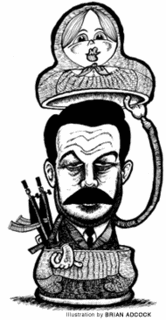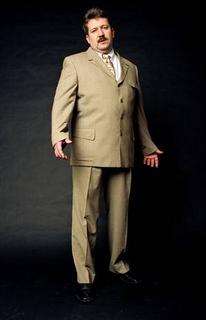Victor Bout

He is the world's largest arms dealer. Here is his story.
Victor Bout was born January 13 of 1967 in Tajikistan. He attended the Soviet Military Institute for Foreign Languages in Moscow and then went to a Russian military college, earning a degree in economics. He speaks six languages fluently. He served in a military aviation regiment until 1991. Two of those years he spent
in Mozambique, at the end of that country's civil war. Retired as a lieutenant
being 25, when the Soviet empire collapsed, bought three Antonovs russian military cargo planes for US$120,000. Nobody knows were he got the money.
Now he lives as a free millionaire man in Moscow (the Russian goverment is
skeptical of the charges against him), has been linked to at least 60 planes, his companies have 300 employees and operate in four continents. In 2003 he gave an interview to Peter Landesman, published by the New York Times Magazine: 
''I woke up after Sept. 11 and found I was second only to Osama.'' The truth, he said, was much bigger than his personal story. ''My clients, the governments,'' he began. Then, ''I keep my mouth shut.''
Later he said, ''If I told you everything I'd get the red hole right here.'' He pointed to the middle of his forehead." ...
...C.I.A. and MI6 agents on the ground in Africa first picked up Bout's scent in the early 1990's, when his fleet of planes began crisscrossing the continent. In the early days, they transported gladiolas; later, frozen chickens and then diamonds, mining equipment, Kalashnikov assault rifles, bullets, helicopter gunships and even, Bout says, U.N. peacekeepers, French
soldiers and African heads of state. The names of the men Bout came to count as his personal friends and customers included Massoud, Mobutu, Savimbi, Taylor, Bemba. It was not until the summer of 2000 that the N.S.C. realized it had stumbled on not only the most prolific arms trafficking operation in Africa, the Middle East and Afghanistan but probably the best connected (and protected) private-weapons transport and brokering network in the world.
¿How does an arms dealing empire start? This is what happened in 1993:
Business really started to boom when he began filling his
planes with South African gladiolas. ''Vic bought a day-old flower for $2 and sold it in Dubai for $100,'' Chichakli said. ''Twenty tons per flight. It's better than printing money." ...
...By 1997, Bout's operations had expanded to an abandoned airfield in Pietersburg, South Africa. He built a refrigeration facility in South Africa to freeze and store chickens, which cost a little over $1 a kilo in South Africa and sold for $10 in Nigeria. ...
... Starting in 1995, Bout expanded his air-freight operations to Ostend, Belgium, and later to Odessa, Ukraine. Eleven years earlier, Ostend had been a transit point for weapons in the Iran-contra operation, leaving behind a comfortable precedent and logistical mechanisms for arms traffickers. So did Belgium's lax arms-trafficking laws. From Sharjah and South Africa, and now from Ukraine and Ostend, Bout did indeed tap
into what Africa and the Middle East needed. But it wasn't gladiolas and frozen chickens.
Most people think that controlling arms shipments is merely a matter of international diplomacy. That may have been true during the cold war, when traffickers were often subcontractors of the superpowers, feeding the proxy conflicts Washington and Moscow wanted fought. After the fall of the Berlin Wall, the exclusive club of arms brokers metastasized. Some brokers still work at the behest of governments and intelligence agencies. But most are now entrepreneurial freelancers who sell weapons without regard for ideology, allegiance or
consequence. They have only one goal in mind: profit. ...
... On the evening of my third day with Bout, the phone in my hotel room rang. A voice said, ''I understand we have things to talk about.'' At first I was taken aback, even amused, by the melodrama. But the voice was coldly sobering. ''Tomorrow, 1700 hours,'' the caller said. ''Go to the McDonald's on Pushkin Square. Buy two cups of coffee and sit at a table. I'll find you.'' Then
he hung up.
At 5 p.m. I went to the McDonald's. It was vast, multitiered and crowded with Russian teenagers. Techno-pop was playing loudly. It was the perfect place for a private conversation.
I put two coffees on a random table and waited. At 5:02, I looked left and right into the crowd, then turned back. A man in his early 40's was in the seat across from me. ''Thank you for the coffee,'' he said.
The man didn't identify himself, but his knowledge of arms trafficking and its various players was expert. He told me that Bout was merely the public face of something much larger and that I was just getting through the surface and that
to go further was very dangerous.
He alluded to two assassinations that had taken place 10 days before. Both victims were executives of a huge air-defense contractor involved in export of antiaircraft weapons and other systems.
He said to imagine the structure of arms trafficking in Russia like a mushroom.
Bout was among those in the mushroom's cap, which we can see. The stalk is made up of the men who are really running things in Russia and making decisions. Looking from above, he said, you never see the stalk. Earlier, in Kiev, Grigory Omelchenko, the former chief of Ukrainian counterintelligence, had said that traffickers like Bout are either protected or killed. ''There's total state control.''
Said E.J. Hogendoorn, the former U.N. arms investigator: ''There was the sense
that there were bigger and murkier forces involved in this. Bout's being protected by highly influential people.''I began to understand why Bout was both eager to
talk and reluctant. Cornered by multiple governments, selling off his assets and hounded by the press, he wanted to complain that he had merely become the fall guy for a criminalized -- and quasi-legal -- political structure much larger and more significant than Victor Bout. But if he revealed too much, he said, he would be perilous.
The interview is much larger, and so are the stories about him. It is also known that every single armed conflict on the surface of the earth has one person in common: Victor Bout. You can find the complete interview at:
disarmo/articles/art_2385.html








5 Comments:
Interesting article, my friend. I`m looking forward for the next one, my little bird.
Adiós,
Don Beño.
Pucha o. En lugar de "Better than printing money" pondría "better than shiting gold" o algo por el estilo.
what is this? arm dealer? ...does he have any legs too?
se dice gun dealer pastel
"Arms" también significa "armas".
El significado de la palabra "gun" está limitada a las armas que puede llevar una persona con sus manos.
Victor Bout no sólo trafica "guns", también trafica misiles, helicópteros y aviones de combate.
Tuve que escribir esto en español para que los pasteles que no saben inglés entiendan.
Post a Comment
<< Home